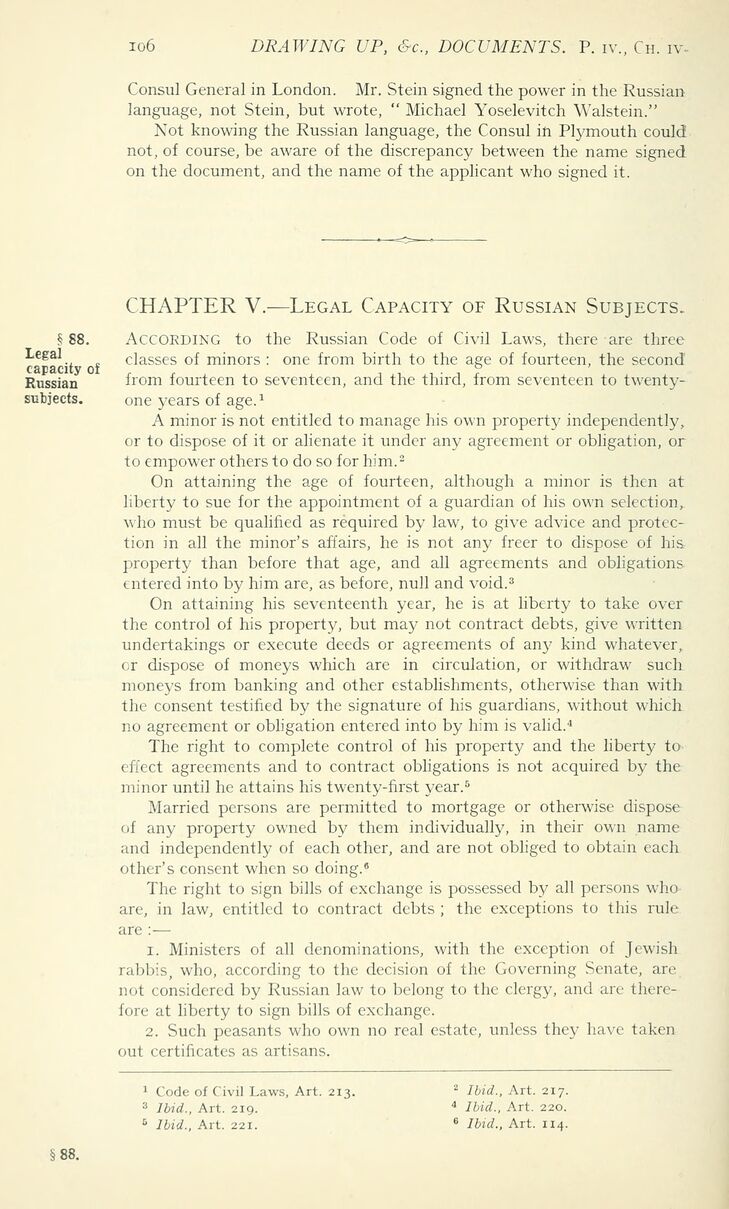
Full resolution (JPEG) - On this page / på denna sida - Pages ...

<< prev. page << föreg. sida << >> nästa sida >> next page >>
Below is the raw OCR text
from the above scanned image.
Do you see an error? Proofread the page now!
Här nedan syns maskintolkade texten från faksimilbilden ovan.
Ser du något fel? Korrekturläs sidan nu!
This page has never been proofread. / Denna sida har aldrig korrekturlästs.
іоб DRAWING UP, Ще., DOCUMENTS. P. iv., Сн. iv-
Consul General in London. Mr. Stein signed the power in the Russian
language, not Stein, but wrote, " Michael Yoselevitch Walstein."
Not knowing the Russian language, the Consul in Plymouth could
not, of course, be aware of the discrepancy between the name signed
on the document, and the name of the applicant who signed it.
§ 88.
Legal
capacity of
Russian
subjects.
CHAPTER V.—Legal Capacity of Russian Subjects.
According to the Russian Code of Civil Laws, there are three
classes of minors : one from birth to the age of fourteen, the second
from fourteen to seventeen, and the third, from seventeen to
twenty-one years of age.1
A minor is not entitled to manage his own property independently,
or to dispose of it or alienate it under any agreement or obligation, or
to empower others to do so for him.2
On attaining the age of fourteen, although a minor is then at
liberty to sue for the appointment of a guardian of his own selection,
who must be qualified as required by law, to give advice and
protection in all the minor’s affairs, he is not any freer to dispose of his
property than before that age, and all agreements and obligations
entered into by him are, as before, null and void.3
On attaining his seventeenth year, he is at liberty to take over
the control of his property, but may not contract debts, give written
undertakings or execute deeds or agreements of an}7 kind whatever,
or dispose of moneys which are in circulation, or withdraw such
moneys from banking and other establishments, otherwise than with
the consent testified by the signature of his guardians, without which
no agreement or obligation entered into by him is valid.4
The right to complete control of his property and the liberty to
effect agreements and to contract obligations is not acquired by the
minor until he attains his twenty-first year.5
Married persons are permitted to mortgage or otherwise dispose
of any property owned by them individually, in their own name
and independently of each other, and are not obliged to obtain each
other’s consent when so doing.6
The right to sign bills of exchange is possessed by all persons who
are, in law, entitled to contract debts ; the exceptions to this rule
are :—
1. Ministers of all denominations, with the exception of Jewish
rabbis, who, according to the decision of the Governing Senate, are
not considered by Ivussian law to belong to the clergy, and are
therefore at liberty to sign bills of exchange.
2. Such peasants who own no real estate, unless they have taken
out certificates as artisans.
1 Code of Civil Laws, Art. 213.
3 Ibid., Art. 219.
5 Ibid., Art. 221.
2 Ibid., Art. 217.
4 Ibid., Art. 220.
6 Ibid., Art. 114.
§88.
<< prev. page << föreg. sida << >> nästa sida >> next page >>